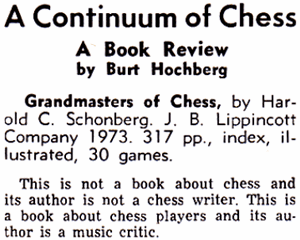Not for Chess Historians
Rummaging through old issues of Chess Life, looking for background stories about the 1970s Fischer boom, I noticed the following book review.

Chess Life, July 1974, p.470
The review continued,
Writing about chess is abundant; more has been written about this game than about all other games combined. One of the reasons is that chess players often find it necessary to write in order, one might say, to support their habit. But of the less than one hundred grandmasters in the world today, very few indeed can express themselves in words with any grace or style or wit. That, after all, is not what we expect from grandmasters. The attitude of a few of them -- that their ability to make a high proportion of correct decisions over the chess board and create beauty under competitive conditions gives them a kind of magic credit card with which they can buy acceptance in other fields of art -- is both absurd and arrogant.
Thus started a positive review of the book 'Grandmasters of Chess' by Harold Schonberg. The reviewer, Burt Hochberg, was the editor of Chess Life from 1966 to 1979, and happens to be one of my favorite chess writers. Schonberg's book, in contrast, doesn't have a good reputation among chess historians. I didn't have to go far to find an example. A post on this blog, Chess History Cat Fight (December 2013), quotes Tim Harding calling it a 'very bad book'.
Edward Winter has about two dozen references to Schonberg on Chesshistory.com, many of them appearing in a 'Chess Note', then repackaged into a feature article. Winter's primary reproach is Schonberg's own repackaging of dubious material, although the note on '4857. Spielmann’s longevity' is much ado about an obvious typo that was corrected in subsequent editions of the book. The site's last word is probably a sentence from the review of William Hartston's The Kings of Chess (1985), where Winter writes,
[Hartston's] book does not claim to be a work of original research. It aims at the same popular end of the market as did Schonberg’s Grandmasters of Chess, but is much superior since it makes better use of better secondary sources.
Back to Hochberg:-
It has been said that the distinction between literature and journalism is becoming blurred. Harold C. Schonberg, the Pulitzer Prize-winning senior music critic of The New York Times, who describes himself as a journalist, confirms that comment in "Grandmasters of Chess." This very handsome book is a contribution to the literature, not the journalism, of chess.
And later:-
Those who have done little or no reading in chess history will find "Grandmasters of Chess" a treasury of discoveries. The author has done his research well and has unearthed a number of fascinating quotations. [...] Nothing in "Grandmasters of Chess" is new -- no startling revelations, no controversial theories -- just solid history, biography, and dozens of good stories. Nor is anything left out. In fact, the thoroughness with which Schonberg illuminates everyone who was anyone in chess is remarkable. It is a tribute to his journalistic flair that he is able to sum up a character and his achievements so succinctly.
I have a copy of Schonberg's book, the Fontana 1975 paperback edition. In the past I've started it several times, but never read more than a few pages. Perhaps this is because the material looked too familiar, perhaps because of opinions like the two chess historians I quoted above, both of whom I admire and respect.
I decided to give the book another chance and was glad I did. I'm always looking for tips about writing style and Schonberg was a master stylist. It's a great read. I haven't finished the book, but can confirm that there is dubious material and I even managed to spot a few gaffes. I imagine that almost every page contains at least one story or 'fact' worth further investigation. Maybe I'll read it a second time with the idea of doing just that. One of the best lessons of chess is to think for yourself.




No comments:
Post a Comment